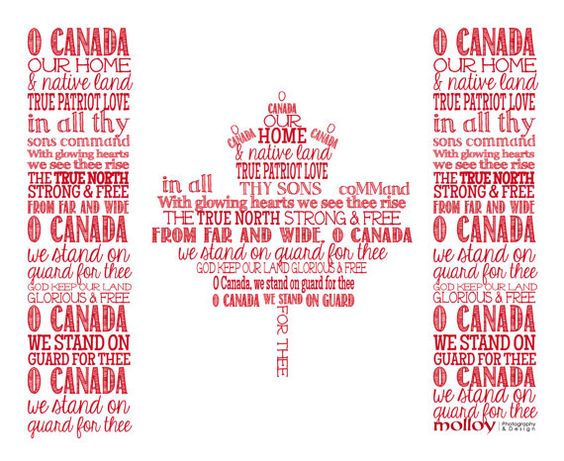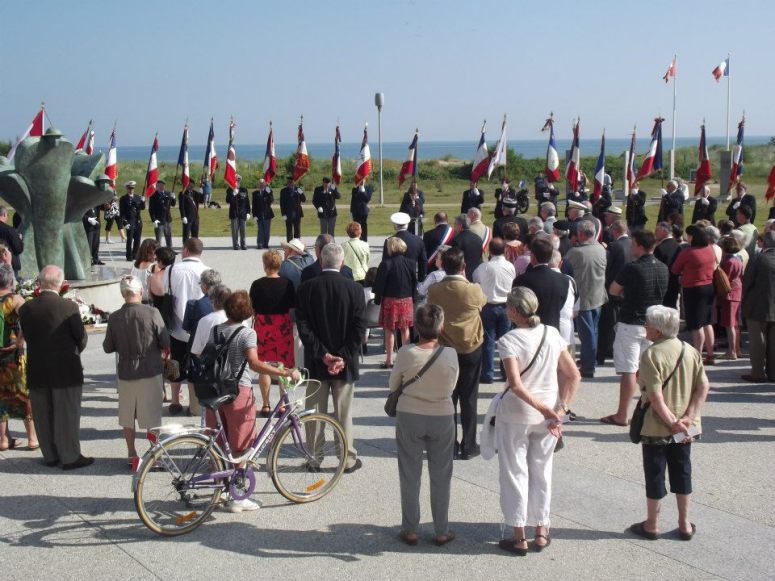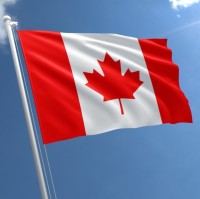
Nearly two months before my sixth birthday, I joined several of my cousins and a couple of family friends on a parade float for our hometown summer celebration, the Festival Acadien de L’Ardoise.
The float’s organizers – my mother and a local schoolteacher, Sharon McGrath – got the idea to have us all singing the Canadian national anthem, over and over, throughout the entire parade route.
Now, when you’re a child handed what might seem like a monotonous task in a public forum, you can handle it one of two ways: Grit your teeth and suffer through it, or embrace the responsibility you’ve been handed and give it all you’ve got. I went with the second option, finding it cool to be trusted with singing a song that represented our entire country of Canada – all ten provinces and (at the time) two territories’ worth of country.
By the time the parade was over, I had sung “O Canada” at least a dozen times and I was hooked on that stirring melody and those words of pride, the flowery yet inspiring descriptions of Canada that I had never heard in my brief time on the planet.
Imagine my delight when I returned to L’Ardoise School to begin the first grade and learned that we would be starting every school day with the playing of “O Canada.” Even more exciting: That recording of the national anthem would take place right in our own music room, and the junior elementary school students would sing along with our music teacher, Lionel Owens, as he played it on the guitar. (I’m the reason they had to do a second take; I kept holding the last note of each phrase long after the other kids had stopped singing. “Oh Ca-na-daaaaaah… Our home and native laaaaaand…” Yes, Mr. Owens, that was me. Oops. Sorry.)
Little did we know that the version we recorded was only months away from being out of date. In 1980, the second verse’s line “And stand on guard, O Canada” was replaced with “From far and wide, O Canada,” while the last verse now opened with “God keep our land glorious and free” instead of “O Canada, glorious and free.” (Yes, you’re reading it right: Religious lyrics were added to, rather than subtracted from, a song performed in public across the country.) The penultimate lyric, “We stand on guard, we stand on guard for thee” also got a slight tweak, becoming “O Canada, we stand on guard for thee.”

Since the only school serving our Acadian community offered core French courses, we also got to learn “O Canada’s” French verses. Or, to put it another way, we learned the original version of the song, created by composer Calixa Lavallee and lyricist Sir Adolphe-Basile Routhier in 1880. (It wouldn’t take hold in English Canada for another quarter-century, and wouldn’t become the entire country’s anthem until the centennial year of 1967.)
In each of Canada’s official languages, “O Canada” followed me – and several other L’Ardoise residents – around for quite awhile, in many different venues. Since it was found in the back of the Catholic Book of Worship, the hymnal used in Roman Catholic churches across the country, the priest that served Holy Guardian Angels Parish from 1996 to 2004, Father John MacIntyre, always asked me to end the last Mass service prior to July 1 – alias Canada Day – by singing the anthem in French and English. (I don’t necessarily find it appropriate to mix worship with patriotism, but I was always moved by this request.)
And when I visited Richmond County’s then-new municipal building in Arichat in 2007 to begin covering my county’s regular council meetings for CBC Radio and The Reporter, I was pleasantly surprised to discover that each council meeting began with the playing and singing of a bilingual version of “O Canada.” (It’s not lost on me that Jason MacLean, the younger son of the teacher that helped me learn “O Canada” nearly 39 years ago, is now Richmond County’s Deputy Warden and participates in this custom whenever council holds a public meeting. So that childhood parade-float ride was good for him, too.)
My five-year stay at Halifax’s University of King’s College taught me to appreciate “O Canada” on a different level. The very-Anglican campus setting naturally lent itself to frequent renditions of “God Save The Queen,” which rarely worked with any layer of my personal background (Acadian, Irish, Scottish). I’ve mellowed somewhat in this regard, especially given the affection shown to “God Save The Queen” by veterans engaging in ceremonies at our local Royal Canadian Legion branches. Still, I was thrilled in 1991 when, following an impromptu musical toast to HRH Elizabeth II at the King’s Christmas Formal Dinner, I quietly suggested to a classmate that we should also be singing “O Canada” – seconds before someone at another table stood up and led a heartfelt rendition of Canada’s true national anthem. (I was even more thrilled when this one-two musical punch repeated itself, without prompting or pauses between the two songs, at similar King’s events prior to my 1995 graduation.)
Two other college-age developments firmly rooted “O Canada” in my heart – the Toronto Blue Jays’ first two World Series Championships, which were accompanied by several spontaneous anthem performances around campus, and the first U.S. invasion of Iraq, which drove home the ugliness of an anthem that celebrates such violent imagery as “the rocket’s red glare, the bombs bursting in air” in comparison to the more straightforward expression of national pride in Canada’s national song. (The Simpsons came to pretty much the same conclusion a decade later, in this sequence which ended the mid-2003 episode “The Bart of War.“)
Coming back to Cape Breton after graduating university gave me two opportunities to perform “O Canada” on a regular basis. In addition to the annual late-June Catholic Mass singing I mentioned earlier, I delivered the anthem to dozens of hockey games at Port Hawkesbury’s MacIsaac Memorial Arena while serving as public address announcer for the West Island Senior Hockey League’s Strait Senior Pirates. The same venue (and its replacement, the Port Hawkesbury Civic Centre) saw me belting out “O Canada” for the Junior B Strait Pirates, the Midget AAA Cape Breton West Islanders, and several provincial minor-hockey tournaments.
The Senior Pirates were also responsible for one of my all-time favourite “O Canada” moments. I joined the boys on the team bus for a 2001 trip to the Senior A Atlantic Hockey Championships in Charlottetown, where they won the bronze medal. As we approached the end of our trip, heading towards the Canso Causeway, I noticed that it was nearing midnight on a Saturday night, announced that it was “the end of our broadcast day,” and led a busload of enthusiastic hockey players in a boisterous rendition of “O Canada.” (The Causeway had already been the sight of another meaningful national-anthem singing – at the stroke of midnight on New Year’s Eve 1999, aka. New Year’s Day 2000, I sang “O Canada” while waving a large Maple Leaf, feeling incredibly emotional that, given the previous three decades’ worth of national unity issues including two Quebec sovereignty referendums, Canada would live to see the new millennium as a strong, united country.)
It all prepared me for my biggest “O Canada” audience – over 3,300 people who saw me lead off a 2003 Quebec Major Junior Hockey League game at Sydney’s Centre 200, home of the Cape Breton Screaming Eagles. A number of Screaming Eagles fans thanked me for singing the second verse in French; I’ve gotten a similar reaction in Port Hawkesbury, where my former editor at The Reporter even started calling me “Roger” after legendary Montreal Forum anthem singer Roger Doucet. I’ll admit that I’m more partial to recent Bell Centre renditions by Quebec music legend Ginette Reno (below, right), but I’ll gladly take the Doucet comparison.
As much as I’ve enjoyed singing “O Canada” over the years, other renditions of the song have touched my heart and continue to do so. Toronto Maple Leafs fans are well-acquainted with the renditions by Scotland native John McDermott, who was only 10 years old when he moved with his family to Willowdale, Ontario in 1965. McDermott was a fixture at Maple Leaf Gardens during the Leafs’ early-’90s resurgence; he still occasionally does that gig for the Leafs at the Air Canada Centre and also did us all a favour by recording “O Canada” (in English and French) on a 2001 collection of various countries’ national anthems. I had the English version playing in my car as I drove home from an early-2005 music rehearsal that finished with a peek at the last few minutes of Canada’s latest victory at the World Junior Hockey Championships; I had happy tears in my eyes for the first few minutes of that drive back to L’Ardoise.
The same year McDermott recorded his anthem-album, one of my personal music heroes, Canadian-born producer and composer David Foster, arranged “O Canada” to record with the Vancouver Symphony Orchestra and Belgian-born singer Lara Fabian (who moved to Montreal and took out Canadian citizenship in 1990). It features two instrumental versions of the anthem and four vocal versions – here’s the all-English version and here’s the all-French version. Depending on your mood, you might find it slightly over-the-top or you could wind up so full of patriotic pride that you’ll attempt to annex Minnesota in the name of the Dominion of Canada. (Not easy. I know. I’ve tried.)
Proceeds from the six-cut album, released through Warner Music Canada in cooperation with the federal government, went to Foster’s charitable foundation. I suspect this effort is largely forgotten by most of the country, and more’s the pity; over 15 years after I bought this album at, of all places, a KFC restaurant in Port Hawkesbury, it remains the one recording of “O Canada” that is guaranteed to move me to at least a small number of tears every time.
(Warning: If you want a full-on bawling session, sit down with me to watch my VHS tape of Fabian singing the anthem live at the Bell Centre for the Habs’ 2001-02 regular-season home opener. It’s an emotionally-charged performance, partly due to the World Trade Centre attacks having occurred a month earlier and partly due to an appearance, moments before the anthems, by Montreal captain Saku Koivu, days after he was diagnosed with non-Hodgkins’ lymphoma. Trust me, I will never, ever, ever erase that tape.)
Now, I know I’m tying a lot of these “O Canada” moments to hockey, but what can I tell you, our most beloved sport (sorry, lacrosse) brings out our patriotic fervour. Prepare for chills as you listen to the final minute of the 2002 Olympic gold-medal men’s hockey championship game (in Salt Lake City, Utah, no less) and hear thousands of Canadians celebrating the end of Canada’s 50-year Olympic drought. (The singing starts at roughly 5:50 of that clip.) Watch a combined 60,000 NHL fans in Ottawa, Montreal and Toronto singing the anthem together in 2014, days after fatal terrorist attacks hit Ottawa and Quebec. (“O Canada” begins at 5:10. Keep Kleenex handy.)
That 2014 anthem-singing by the way, was launched by long-time Ottawa Senators anthem singer Lyndon Slewidge, who has repeatedly won me over during the past quarter-century by belting out the anthems for NHL games in the nation’s capital, partly because he follows a 1992 orchestral arrangement that began the broadcast day at my first radio workplace, Port Hawkesbury’s CIGO-AM (now 101.5 The Hawk), during the ’90s. He saved arguably his best performance for Game 3 of the 2007 Stanley Cup Finals, the only game the Sens won in five tries against the eventual NHL champion Anaheim Ducks. (Trivia: Alanis Morrisette sang the anthem for Game 4, fifteen years after performing it at the first-ever home game for the modern-day Sens.) Strangely, Slewidge’s contract wasn’t renewed last fall as Sens management attempted to diversify the anthem singers; I hope this isn’t the last time the retired Ontario Provincial Police officer treats hockey fans in Ottawa (and across the country) to “O Canada.”

And yet, one of the most special anthem performances I’ve ever experienced occurred outside of Canada – specifically, in northern France, where Cathy and I had the great honour of experiencing La Semaine Acadienne in the community of Saint-Aubin-sur-mer. The week-long celebration of all things Acadian is a thank-you to the soldiers of New Brunswick’s North Shore Regiment, who fought to protect the seaside town during Canada’s D-Day efforts in June, 1944. La Semaine Acadienne traditionally includes a ceremony (pictured above) at Centre Juno Beach in nearby Courseulles-sur-mer, and as part of this ceremony, Normandy citizens sing the national anthems of France and Canada back to back. I have rarely been so moved by any rendition of “O Canada” as I was by the combination of dignity, gratitude and graciousness displayed by our French hosts on this sunny summer morning in 2012.
That life-changing visit to France, by the way, came just a couple of weeks after the Festival Acadien de L’Ardoise celebrated its 50th anniversary. What an amazing way to bring my first taste of “O Canada,” in the L’Ardoise event’s 1978 parade, full-circle.
[Footnote: Yes, I’m well aware of the current drive to change one of the lyrics to “O Canada.” I’ll have more to say about that later this year. That’s a threat and a promise.]












The fact that my husband regularly tears up listening to our anthem flies so contrary to my vow to never sing the anthem for decades in my youth. I felt patriotism was just a way to increase national pride which I observed in the US was somehow an invitation to violence, war and xenophobia. Please understand these were beliefs based entirely on TV viewing and youthful angst. As I’ve matured (lol no really) my opinions have changed. While I still worry that some cultures and societies are more prone to self-protectionism, I know Canada is not one of them. When we sing our anthem it is with the best type of national pride. I sing along with you but save my tears for those times Canadian athletes bring giant flags into Olympic stadiums – showing national pride in a simple piece of cloth!
LikeLike